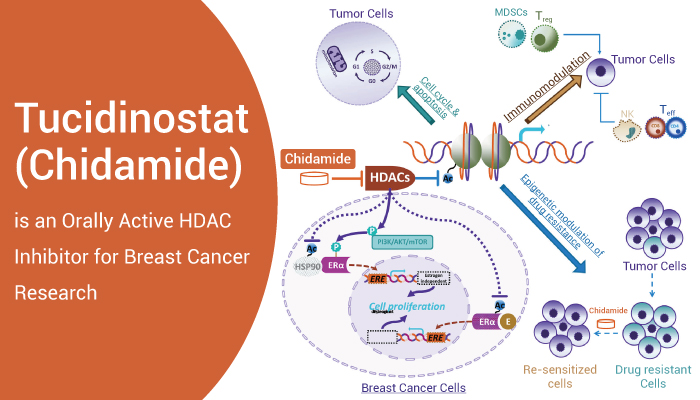HDACs (Histone deacetylases) are a class of enzymes that remove acetyl groups (O=C-CH3) from an ε-N-acetyl lysine amino acid on histone. HDACs allow the histones to wrap the DNA more tightly. This is important because DNA is wrapped around histones, and DNA expression is regulated by acetylation and de-acetylation. HDACs play a key role in the epigenetic regulation of gene expression. In addition, elevated expression or activity of HDACs is implicated in the development and progression of cancer. Inhibition of HDAC enzymes results in increased histone acetylation, thereby inducing an open chromatin conformation and transcription of previously dormant genes.
In humans, there are 18 HDAC enzymes that use either zinc- or NAD+-dependent mechanisms to deacetylate acetyl lysine substrates. The Class I Rpd3-like proteins (HDAC1, HDAC2, HDAC3, and HDAC8); the Class II Hda1-like proteins (HDAC4, HDAC5, HDAC6, HDAC7, HDAC9, and HDAC10); the Class III Sir2-like proteins (SIRT1, SIRT2, SIRT3, SIRT4, SIRT5, SIRT6, and SIRT7); and the Class IV protein (HDAC11).

Tucidinostat is an orally active HDAC1/2/3 and HDAC10 inhibitor.
Meanwhile, Tucidinostat (also known as Chidamide, HBI-8000 or CS 055) shows less active on HDAC8 and HDAC11, and has no effect on HDAC4/5/6/7/9. Importantly, Tucidinostat displays broad spectrum antitumor activity in vitro and in vivo. From the mechanism of action, Tucidinostat stimulates human immune cell-mediated tumor cell killing activity with increased expression of genes and proteins involved in natural killer (NK) cell functions.
In vitro, Tucidinostat inhibits several human derived tumor cell lines, such as HL-60, U2OS, LNCaP. In addition, Tucidinostat shows less toxic to normal cells from human fetal kidney (CCC-HEK) and liver (CCCHEL). Furthermore, Tucidinostat (12.5-50 mg/kg, p.o.) dose-dependently reduces tumor size in mice bearing HCT-8 colorectal carcinoma, A549 lung carcinoma, BEL-7402 liver carcinoma, and MCF-7 breast carcinoma. And Tucidinostat does not cause obvious weight loss.
To sum up, Tucidinostat is an orally active HDAC1/2/3 and HDAC10 inhibitor, and displays broad spectrum antitumor activity in vitro and in vivo.
References:
[1] Ning ZQ, et al. Cancer Chemother Pharmacol. 2012 Apr;69(4):901-9.